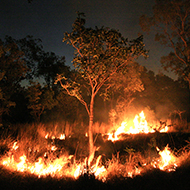
Rangers shun evacuation order to protect all 200 residents
All 200 animals at Mogo Wildlife Park in New South Wales have been saved from surrounding bushfires, thanks to the brave efforts of staff “that love the animals like their family”.
Mogo Wildlife Park is a privately-owned zoo that is home to one of the largest collection of primates in Australia, as well as zebras, giraffes and southern white rhinos.
Speaking to ABC News, zoo director Chad Staples said the conditions were “apocalyptic”, adding that his staff were only able to save the animals because they had a fire defence plan.
"Right now in my house there's animals of all descriptions in all the different rooms, that are there safe and protected... not a single animal lost," he told the ABC broadcaster.
An evacuation order was issued for the zoo at around 6 am on Tuesday (31 December), but staff decided to remain to protect the animals.
In an interview with BBC 5 Live Radio, Sara Ang from the wildlife park explained that “some of the smaller monkeys had to be moved to the house, the red panda is in the house and there's a tiger in the back area of the house".
"All the animals that needed to be moved indoors have been moved indoors," and hence are safe from the fire,” she said.
More dangerous animals, such as lions and orang-utans, were moved to their night enclosures, where they were able to remain calm and protected from the fires. Mr Staples said that giraffes and zebra were the only animals to show any signs of stress “but that was more to do with the activity of keepers being all hands on deck.”
"The zoo's plan was always to defend the site, because we could make it safe here for all the animals," Mr Staples continued. "Thanks to the amazing team that just love these animals like their family, we were able to do so. It was amazing.
"We got out and we watered everything we possibly could. Any species of animal that was small enough or in an area that we couldn't protect, we caught up."



 The RCVS has announced a new version of its 1CPD mobile app, with enhanced features for veterinary surgeons and veterinary nurses to record their continuing professional development.
The RCVS has announced a new version of its 1CPD mobile app, with enhanced features for veterinary surgeons and veterinary nurses to record their continuing professional development.